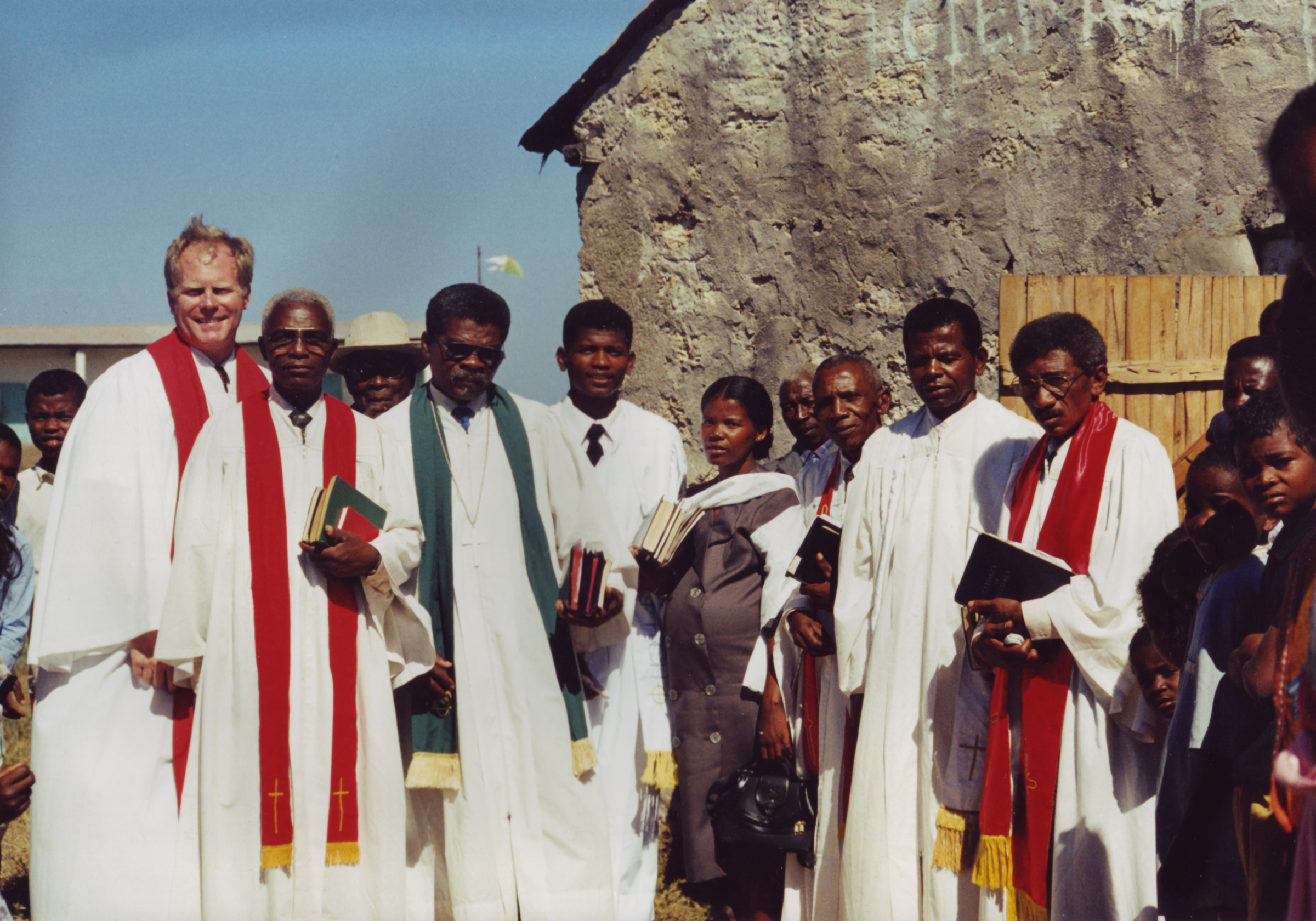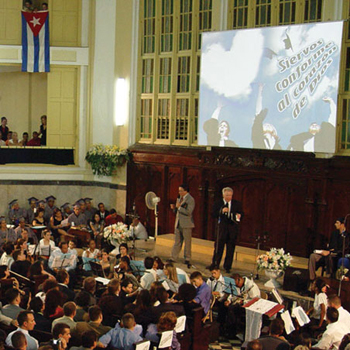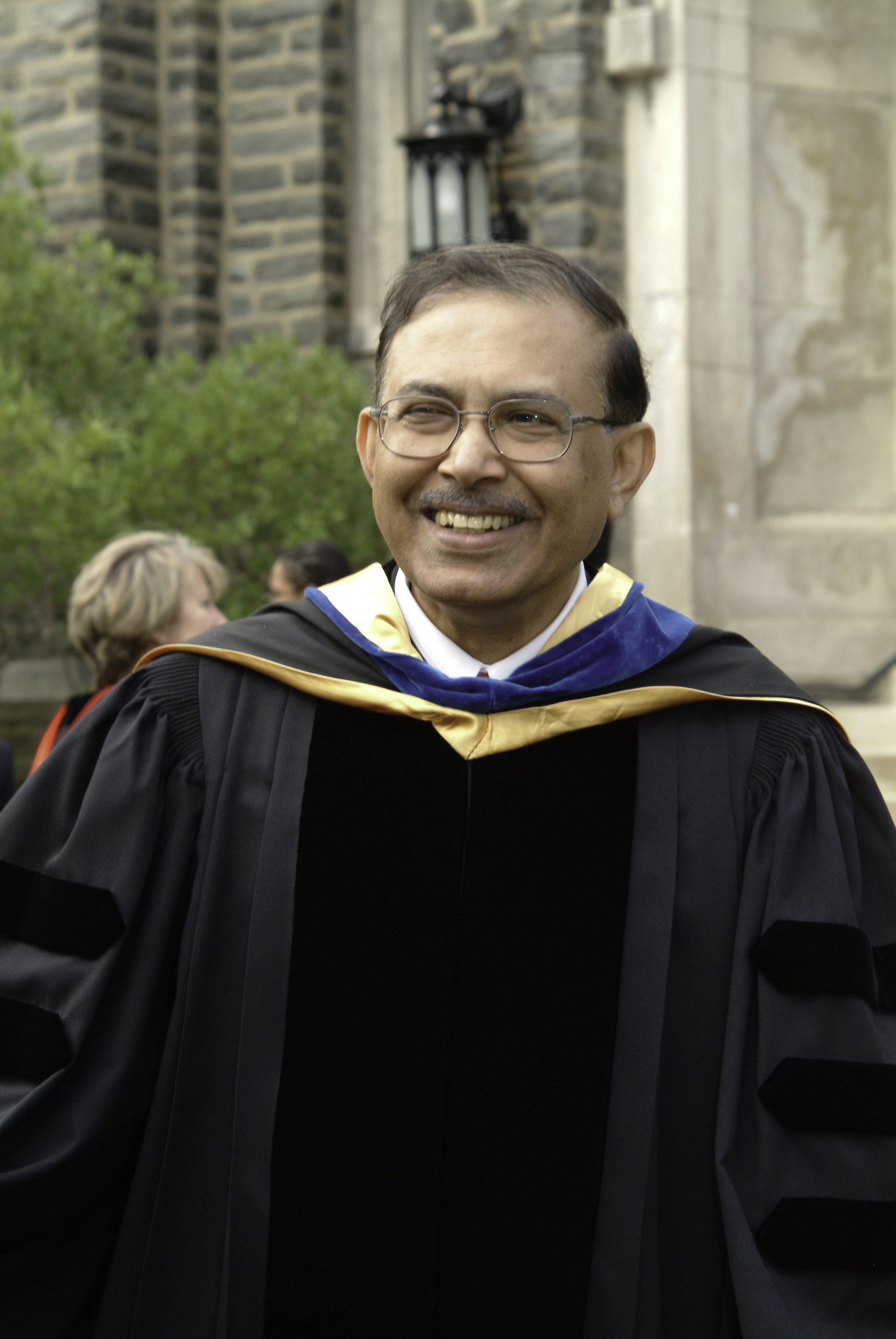 |
|
The Rev. Kevin Ogilvie (at left) attends the ordination of Lahinirina Fenoandro Joseph (center, standing with his wife, Manisafeno Estherine) at the Lutheran church in Faux Cap, Madagascar. (COURTESY KEVIN OGILVIE)
|
IN 2002 HISTORIAN PHILIP JENKINS turned a popular perception of Christianity upside down. His widely acclaimed book, The Next Christendom: The Coming of Global Christianity, documented the dynamic growth of Christianity in the global South and the eclipse of North America and Europe as the dominant centers of the faith. "Over the last century," Jenkins wrote, "the center of gravity in the Christian world has shifted inexorably southward" to Africa, Latin America, and Asia. Lands that Europeans and North Americans once envisioned as "heathen" had become hosts to the world's largest and fastest-growing Christian communities.
The result? The "typical" contemporary Christian these days looks not like a suburban North American, but instead like a Catholic villager in Nigeria or an urban Pentecostal in Brazil. Jenkins projected that by 2050 non-Hispanic whites will comprise only 20 percent of the world's Christian population. "The era of Western Christianity has passed within our lifetimes," he said, "and the day of Southern Christianity is dawning."
The evolution of global Christianity creates questions and opportunities for North American theological schools.
-
What does it mean to prepare leaders to serve not only local congregations but also the worldwide church?
-
What lessons can leaders learn from the dramatic growth of churches in non-Western contexts?
-
And, not least, what are the responsibilities of North American seminaries, which are themselves financially stressed but nevertheless can marshal more resources than schools in the developing world?
Theological school presidents and deans who have international experience can offer important insights into these issues.
They share a commitment to respond to the changing face of global Christianity. Many have developed common strategies for exposing board members, faculty, and students to the priorities, insights, and needs of Christians around the world. And though several challenges complicate their goals, they remain committed to discerning their community's role within global Christianity.
Engagement and responsibility
Presidents and deans who have lived outside of North America place a high value on their experience, and most feel that their own students, and North Americans in general, lack sufficient knowledge of non-Western societies. "We need to learn respect for the complexity of other cultures and the way their churches look on a day-to-day basis," says Sulpician Father Thomas R. Hurst, president-rector of St. Mary's Seminary and University in Baltimore. Hurst previously served as academic dean at St. Dominic's Seminary in Lusaka, the capital of Zambia, a country in which more than 75 percent of the population lives in poverty and more than 15 percent have HIV/AIDS. "What drives the life of the Zambian church is the care for people who are desperately poor and in need," Hurst says. Although the North American poverty rate is much lower, Hurst believes that the issues and challenges faced by non-Western Christians should be incorporated into North American agendas. "The American church is not the paradigmatic one," he insists. "Our board and faculty need a broader view of what it means to be part of the Catholic church."
The vitality of global Christianity can prove especially inspiring to North Americans in theological education. The Rev. Kevin Ogilvie is now the president of Lutheran Theological Seminary in Saskatoon, Saskatchewan, but he spent 13 years as a missionary in Africa, including a stint as director of the Regional Lutheran Theological Seminary in Bezaha, Madagascar. While there, he witnessed firsthand the incredible growth of the country's Christian communities. "People would just evangelize and build churches," he recalls. "They didn't wait for church authorization or leadership." He hopes that appreciation for the growth of Christianity in Africa, Latin America, and Asia will drive North Americans to ask themselves, "What happened to our spark? Why is our enthusiasm for our faith so muted?" With many American and Canadian denominations shrinking, Ogilvie believes that the dynamism of Christianity in other parts of the world can combat discouragement among board members, faculty, and students, renewing their vision for ministry.
 |
|
The Rev. Paige Patterson (on platform at right) preaching in Cuba. (COURTESY PAIGE PATTERSON)
|
Leaders with significant overseas experience often hope that their constituents will wrestle with issues of personal responsibility. "We live in selfish, opulent America," says the Rev. Paige Patterson, president of Southwestern Baptist Theological Seminary in Fort Worth. Motivated by his own international preaching missions and his service on the governing boards of seminaries in Romania and Germany, Patterson has encouraged his school to address the material and financial needs of Christians worldwide. On an institutional level, Southwestern has responded to requests from international seminaries to provide financial aid, assistance in establishing libraries and technology, and faculty training. "We cannot afford the luxury of selfishness," he says. "Gratitude for God's blessings forces us to accept responsibility for the rest of the world."
Strategies for engagement
North American theological school leaders have adopted several strategies to expose their communities to the insights and needs of Christians around the world. For example, many seminaries encourage and some even require students and others to take international trips. Under the leadership of academic dean Paul Rajashekar, for example, Lutheran Theological Seminary at Philadelphia has included not only students and faculty but also board members in "global awareness travel seminars" to places such as Tanzania and Egypt. "The goal is for participants to gain an understanding of the religious, cultural, economic, and political dynamics of the host countries," reads the seminary catalog, "and to struggle with implications for ministry both on site and at home." Faculty members are encouraged to spend at least part of their sabbaticals overseas.
While Southwestern Baptist Seminary provides opportunities for students to minister in developing nations as part of their education, the school actually requires faculty to do so once every four years. "This takes us out of the local ivory tower to directly encounter poverty and AIDS," Patterson says. "It produces a sense of gratitude and responsibility."
In addition to promoting firsthand experiences, presidents and deans sometimes advocate curriculum revisions that increase students' global awareness. After teaching in both India and Switzerland, Rajashekar was surprised by "how parochial American theological education is." He laments that church history courses sometimes neglect not only recent growth but also the long traditions of eastern and southern Christianity, and theology courses sometimes ignore the contributions of liberation theology and "post-colonial" studies (which examines missionary work and other intercultural interactions from the perspective of the "recipient" culture rather than the "sending" culture). Rajashekar argues that schools must to respond to realities of "theological globalization" in which ideas are borrowed, transformed, and adapted across cultures in multiple directions.
Finally, leaders also point to the importance of hiring international faculty. "Board members should try to encourage diversification of the faculty appointments," says Rajashekar. As dean, he makes a conscious effort to recruit candidates who will challenge the cultural assumptions of North American students and enrich their preparation for ministry in a global context.
Costly involvement
Financial challenges complicate the plans of leaders to increase understanding of Christianity beyond North America, and presidents and deans acknowledge budgetary constraints. "Board members rightly tend to look at bottom lines," says Ogilvie, president of the Lutheran seminary in Saskatchewan. In conjunction with a course in globalization and ethics, his school has made a "cross-cultural immersion experience" part of its degree requirements -- faculty prepare students and accompany them on foreign trips. Despite believing that this experience represents a vital part of his students' theological education, Ogilvie recognizes that he must consistently persuade his board to fund the program. "Although staying at home is cheaper," he says, "we must keep the vision that we are part of a church that is global and that we must learn from how others see the world."
Patterson faces a similar issue with his board of trustees. "It is costly to be involved in these worldwide efforts," he says. Like other presidents, Patterson devotes time to sharing with his board members why he believes such initiatives are vital to obeying God's call to love and to minister to the world.
 |
| The goal for participants in travel seminars sponsored by the Lutheran Theological Seminary at Philadelphia, says Dean Paul Rajashekar, is to gain an understanding of the host countries and to struggle with the implications of this knowledge for ministry -- both on site and at home. (LUTHERAN THEOLOGICAL SEMINARY AT PHILADELPHIA) |
For most schools, efforts to enhance global awareness and responsibility require not only the cooperative efforts of the administration and board but also creative strategies for locating funding. Some leaders may want to focus on educating donors about the roles and responsibilities of their institutions within global Christianity. Capital campaigns may spotlight the practical benefits of international experiences that augment the ministries of students and faculties. Administrators may explore ways to collaborate further with mission boards in developing programs and in providing funds for trips. In the face of financial pressures, presidents and boards will need to find the right balance between the needs of their own institutions and the pressing concerns of the worldwide church.
Questions for boards
■ How do we interpret the seminary's mission in light of the challenges and benefits of participating in a global church?
■ What do we know about the worldwide presence of the seminary's sponsoring denomination or church? How many graduates are engaged in international ministries (as foreign missionaries, as "home missionaries" to international groups in North America, or as pastors of international churches)? What is the percentage of foreign-born people in our church's North American pews? How is the board learning about the effectiveness of our graduates in international ministry?
■ What do we know about financing international programs for students and faculty? What new sources of funding can be researched through our school's alumni or friends?
■ What resources (faculty, denominational officials, board members with expertise in international issues) are available to increase our knowledge and commitment to supporting ministry in a global church?